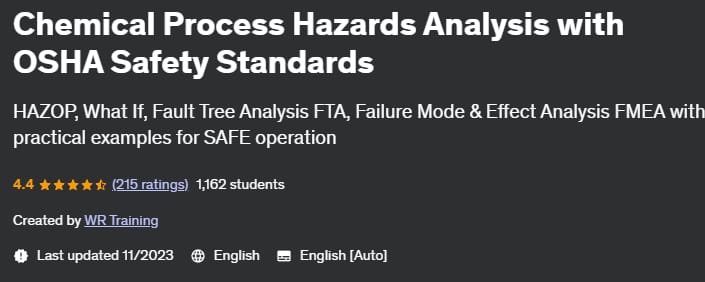Description
Chemical Process Hazards Analysis with OSHA Safety Standards, the chemical process hazard analysis training course with OSHA safety standards has been published by Yudemy Academy. Analyzing process hazards and managing process safety is a critical skill in our complex industrial world. Recent catastrophic events, such as the Deepwater Horizon explosion or the Beirut port explosion, highlight the dangers of poor process safety management. In this regard, the Occupational Safety and Health Administration (OSHA) is one of the leading agencies in setting safety standards for analyzing process hazards and establishing effective safety management programs. OSHA’s Process Safety Management Standard for Highly Hazardous Chemicals (29 CFR 1910.119), known in this period as the PSM rule, includes an integrated set of chemical process safety management elements designed to prevent releases of chemicals that could lead to Designed to withstand catastrophic fire, explosion, or toxic contact.
One of the most important elements of this PSM rule is Process Hazard Analysis (PrHA). This analysis requires systematic identification of risks and scenarios of related events. Any plant or process facility that stores or uses hazardous chemicals in amounts above the threshold defined by the PSM Act must develop the capability to complete a process hazard analysis as required. Therefore, as a potential player in this facility, it is very important to have a thorough understanding of the standards and techniques for analyzing and mitigating process safety risks. By ensuring that these standards are properly understood and applied, you help keep your facility, your coworkers, and yourself safe.
What you will learn
- Learning key steps and methods to systematically identify risks and related incident scenarios
- Acquaintance, understanding and implementation of OSHAIS Process Safety Management Act, PSM (29 CFR 1910.119)
- Gain a clear understanding of key components of process safety methods for process hazard analysis (HAZOP, FMEA, FTA, What-If, Checklist…)
- Perform any of the following process hazard analysis: HAZOP, failure mode and effects analysis (FMEA),
- Fault Tree Analysis (FTA), What-If, Checklist…
- Define applicable roles and responsibilities in different process hazard analysis (HAZOP, FMEA, FTA, What-If, checklist…)
- Familiarity with laws, standards and regulations related to occupational safety
- Assess operations and process maintenance to promote a safe work environment
- Pay attention to the safety of your facility, your colleagues and yourself
- Develop your process risk analysis skills through various practice sessions covering real industrial processes.
- Test your knowledge through valuable technical quizzes.
Who is this course suitable for?
- Active personnel in refineries, petrochemicals and chemical factories
- Process engineers
- Chemical engineers
- Design engineers
- Maintenance engineers
- Safety engineers
- HSE specialists
Course specifications Chemical Process Hazards Analysis with OSHA Safety Standards
- Publisher: Udemy
- teacher : WR Training
- English language
- Education level: introductory
- Number of courses: 106
- Training duration: 4 hours and 59 minutes
Chapters of Chemical Process Hazards Analysis with OSHA Safety Standards course
Course prerequisites
- Some engineering or field knowledge is preferable but not mandatory. All the concepts are explained in depth using an easy to understand language to allow students to build their knowledge from the ground up
Pictures

Sample video
Installation guide
After Extract, view with your favorite Player.
English subtitle
Quality: 720p
download link
File(s) password: www.downloadly.ir
Size
1.45 GB